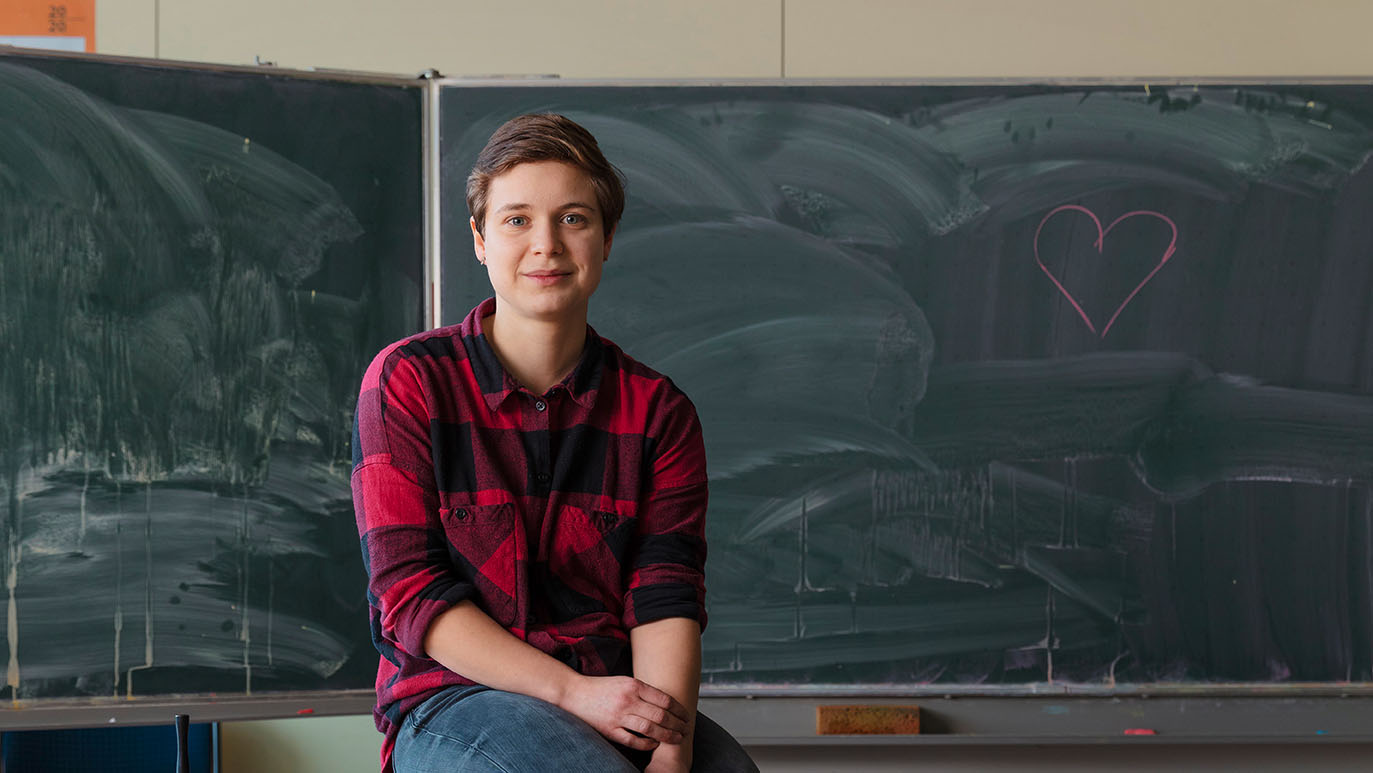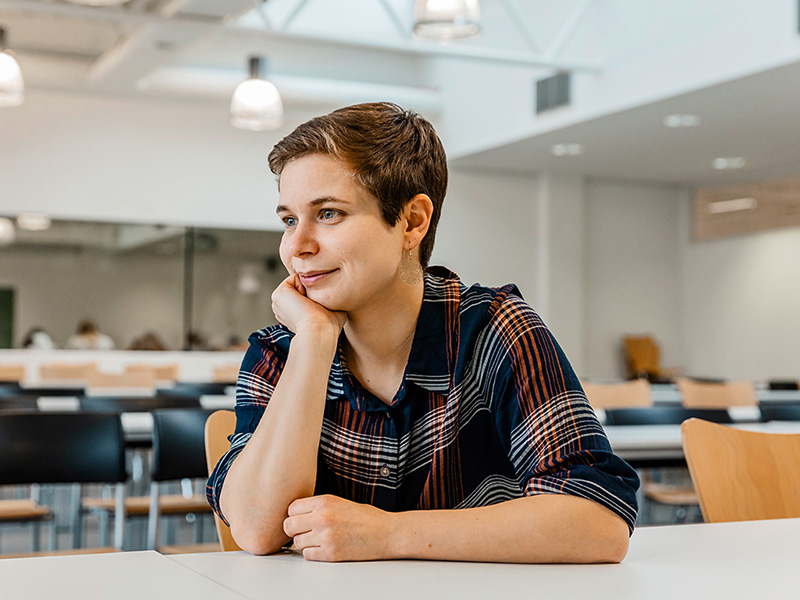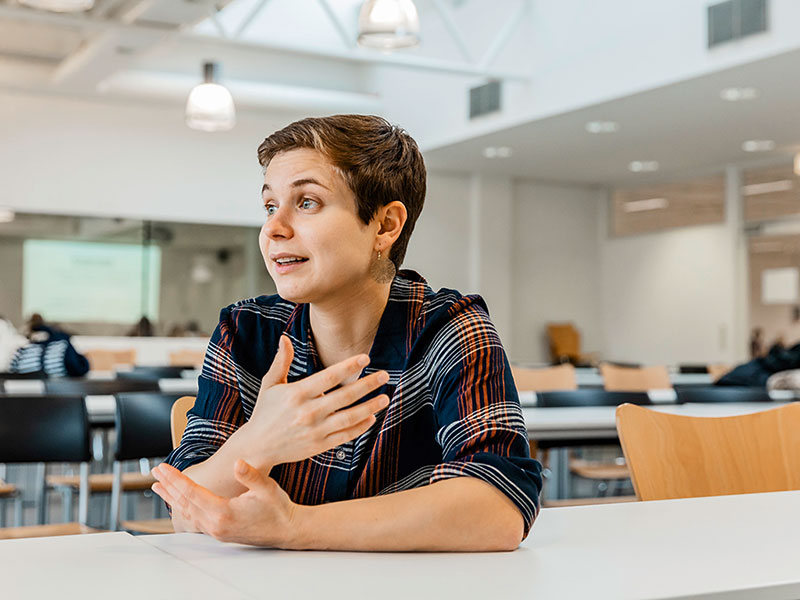
©GfG/Universität Bremen
And then? I listened to the voice inside
Your degree is over, bring on your first job – or not? In the new Yearbook of the University of Bremen, graduates tell us about their lives after graduation.
From 2012 to 2019, Kimberly David studied biology and French with a teaching orientation at the University of Bremen. Whilst studying, she worked as a student assistant at the International Office. She was able to contribute to the founding of the European YUFE – Young Universities for the Future of Europe – project there. She is currently in the mid- dle of her teacher training at the Oberschule Lerchenstraße school in Bremen-Nord.
Ms. David, you were born in Hamburg. How did it come about that you came to Bremen?
It all started with a detour. I initially began studying business psychology in Bielefeld but I did not enjoy it. I was always thinking about how I would organize my first French lesson – even though I was doing an entirely different degree. At one point, something just clicked and I told myself that I should probably study with a teaching orientation in order to actually be able to give French lessons. That is how I changed direction and came to Bremen to study for a teaching qualification.
What were French lessons like at your school? And why do you want to be a teacher?
As a teacher, you have such a great influence on transferring new knowledge in a positive manner. For example, French is such a great language but has an awful reputation. I hope that I can make it appealing for the school pupils. The French language was my absolute favorite subject. I always thought about how I can enthuse others for the language, much like my teacher did.

©GfG/Universität Bremen
During your time at the University of Bremen, you not only studied but also actively worked in the International Office of the University of Bremen for a long time. Was that a coincidence or an objective of yours?
After my semester abroad, I worked at the International Office as a student assistant and was responsible for internships abroad. In total, I worked there until the end of my master’s degree, so four years. After my intership abroad, I worked there for another six months. It was coincidence that there was a free position but in terms of content, it was an objective for me. Europe is definitely my second passion. After completing my high school qualifications, I carried out my voluntary service in Brussels, my Erasmus studies in Reims, and my Erasmus internship as a foreign language assistant in Turin. I am enthralled by the European idea. I really enjoy working in this context and having contact with foreign students. And thanks to YUFE, I have become involved in many other things.
The University of Bremen is part of the YUFE alliance and will create one of the first European universities together with seven other universities. What was your role in this?
Students were supposed to be involved in the development of the program right from the beginning. I travelled to Brussels as a Bremen student representative. We, as full members, worked on the creation of YUFE, were part of the various working groups, designed differ- ent concepts, and were able to contribute our experience. We also succeeded in enforcing that students have the same voting rights in the upper committees.
“ I am convinced that we can achieve more together than we can alone.“
To what extent was YUFE an opportunity for you to be active for Europe? And why is that important in your opinion?
YUFE is the European concept. Eight universities from eight different countries are involved in the project. There are additional partners from many more countries. To become active for the project means not only being active for the University of Bremen but rather also for Bremen in itself. There will be strong net- working with other European towns and com- munities.YUFE is studentoriented, open, and inclusive. That means that everybody, regardless of their needs or limitations, is invited to take part. I think that is amazing. I am convinced that we can achieve more together than we can alone. It is irrelevant if my friend lives in Italy or if I have a friend in Sweden – we can communicate and visit each other – we can discover common ground. That means a lot to me. It is also important that the younger generation realizes what a good idea it is to live the European idea.
To what extent do you, as a teacher, profit from your time abroad and your practical work in this field?
My school is a UNESCO project school and I am the program coordinator. This project deals with internationalization and commu- nication. The Erasmus program is not only available at universities but also at schools. I obviously have a great deal of experience in this area. I can see a cooperation between schools and the University of Bremen being created so that my pupils can be introduced to international students and projects. The ear- lier one experiences this, the more convinced one is of the European idea.

deals with internationalization and communication.
©GfG/Universität Bremen
Was it ever up for discussion if you would become a teacher or if you would remain in the field of internationalization at the University of Bremen?
Definitely. It is still on my mind and I would describe it as being an extra pillar of my career. I do not mean that it is a plan B but rather a different plan A. It would surely bring me as much enjoyment. I have decided to initially complete my teacher training and to then see to what extent this career fulfils me.
You were still active for YUFE when you started your teacher training in the summer of 2018. Do you still do both?
My teacher training is in the foreground at the moment. This means that I unfortunately no longer have enough time for YUFE. However, I can imagine becoming more involved at a later point in time – that would then be in my role as a teacher who coordinates the contact between schools and the university.
Kimberly David studied French and Biology in her Master’s degree at the University of Bremen until 2018. Prior to that she studied French and Biology in her Bachelor’s degree with teaching orientation until 2015, also at the University of Bremen. During her bachelor’s studies she spent a semester abroad at the University of Reims Champagne-Ardenne.